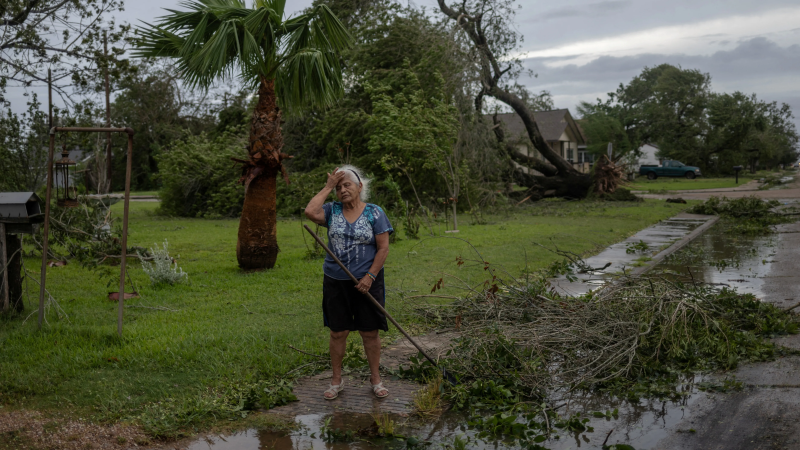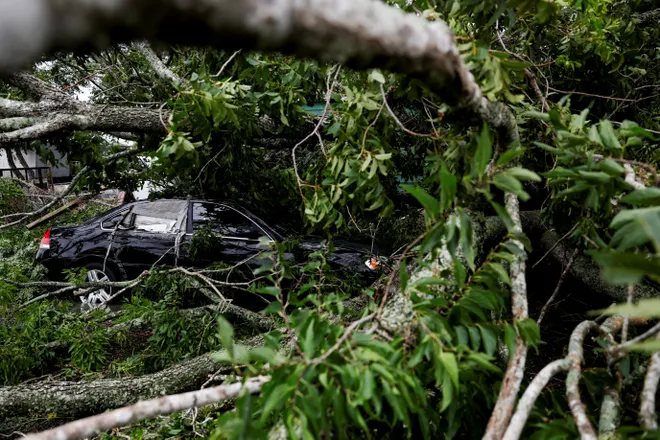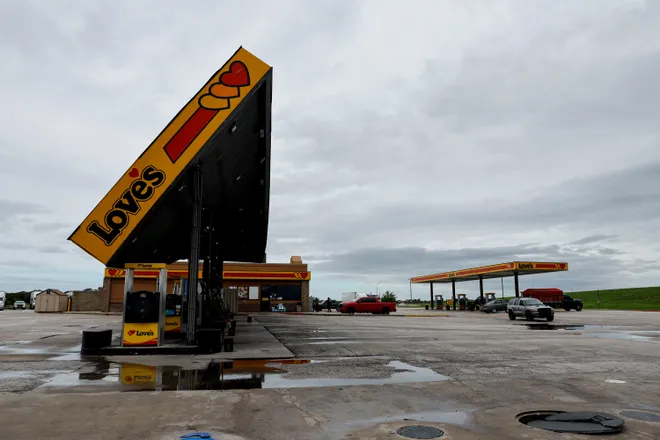Beryl leaves millions without power as heat scorches Texas; at least 8 dead: Live updates
In the wake of Hurricane Beryl, millions of Texans woke up on Tuesday without power as high temperatures and humidity blanketed much of the state's southeast, triggering weather advisories as the deadly storm pushes further inland, bringing heavy rain and winding up the central U.S.
Beryl, which was the season's earliest Category 5 hurricane on record, had weakened to a tropical storm after it made landfall on the Texas coast early Monday as a Category 1 storm — turning streets into rivers, trapping people in their cars and knocking out power to more than 2 million homes and business. The storm has been linked to at least eight deaths in Texas and Louisiana.
Now a tropical depression, Beryl is expected to weaken as it moves further inland, though it will remain potent enough to drop several inches of rain on multiple states and spin up tornadoes as it heads toward the Northeast, according to the National Hurricane Center. On Tuesday, over 21 million people from Arkansas to Michigan were under flood watches, the National Weather Service said.

Texas Lt. Governor Dan Patrick warned that while Beryl has moved out of the state, dangerous flooding could last for several days. "We're not past any flooding, we're not past any difficult conditions," he said a news conference Monday.
The deadly storm swept through Jamaica, Grenada, and St. Vincent and the Grenadines last week. At least 11 people were killed in Mexico and the Caribbean before Beryl reached Texas.
See outage map:Beryl leaves millions without power, heads toward Mississippi
Developments:
∎ In Harris County, which encompasses Houston, the sheriff's office's high water rescue team continued responding to incidents across the city on Tuesday.
∎ Officials with the city of Houston asked people to "avoid all unnecessary travel" on Tuesday to clear the roads for authorities working to clear debris and restore power.
∎ More than 2,500 first responders were deployed statewide to assist in the recovery effort, according to Nim Kidd, chief of the Texas Division of Emergency Management.
∎ President Biden pledged federal resources in a statement on Monday. His administration "will make sure Texans have the resources they need to get through the storm now and to recover moving forward," he told Houston Mayor John Whitmire.
Hundreds of egrets killed during Beryl, hundreds rescued
Hundreds of egrets were thrown from their nests and drowned as Hurricane Beryl slammed southeast Texas on Monday, the Houston chapter of the Society for the Prevention of Cruelty to Animals (SPCA) said in a statement.
The nonprofit said specialists with it's wildlife center in Texas were on scene in Cypress, a city just northwest of Houston, to rescue the injured and orphaned egrets that survived.
The specialists were expected to bring back around 300 birds to their campus for triage and medical care, the statement said.
Egrets are all-white wading birds commonly found in wetlands across the United States. They're found throughout Texas and the Gulf Coast states year-round, according to the Houston Audubon Society.

Dangerous heat to scorch East Texas amid Beryl outages
In the wake of Hurricane Beryl, a dangerous form of extreme weather is expected to bear down on millions of residents across eastern Texas where millions are still without power: Extreme heat.
Weather officials issued a heat advisory from 7 a.m. Tuesday to 7 a.m. Wednesday across much of southeast Texas, from the Gulf Coast up though Houston and Montgomery County. Heat index values, also called "feels like temperatures" are expected to reach 105 degrees in the afternoon, prompting authorities to urge residents to find places with working air conditioning, drink plenty of water and to check in on neighbors, friends and relatives.
"While this would normally be below criteria for a Heat Advisory, the widespread loss of power and air conditioning across (southeast Texas) could make for dangerous conditions through the day," the weather service in Houston and Galveston said. "This will be especially true for those still cleaning up outside who may not have a chance to properly cool off."
Extreme heat is the deadliest form of extreme weather. This week, a relentless heat wave scorching the West Coast is suspected to have killed at least five people as temperatures soared into the triple digits. More record-breaking heat was expected to scorch the West Coast in the coming days, with some areas reaching up to 30 degrees above average, the National Weather Service said.
More:Record-high temperatures from Portland to Phoenix as heat wave continues. Is end in sight?
Beryl's path from Arkansas to Vermont
Beryl is projected to drench a vast swath of the central and eastern U.S. as it unleashes thunderstorms capable of producing tornadoes from the lower Plains to the Northeast.
The storm is expected to move over Arkansas and enter the lower Ohio Valley by Tuesday evening, threatening the region with possible tornadoes, according to the National Weather Service. The heaviest rainfall will follow Beryl's track through Arkansas, Missouri, Illinois and Indiana through late Tuesday, where up to 8 inches can fall, AccuWeather Senior Meteorologist Bill Deger said.
"Since the storm will be moving fast, this rain can fall in just a matter of hours, leading to reduced visibility for motorists and flash flooding on highways and in poor-drainage areas," he said.
On Wednesday, the storm is forecast to bring its "prolific heavy rain" and tornado threats to the lower Great Lakes and northeast regions, including Upstate New York, northern Pennsylvania and parts of Vermont. Torrential downpours are expected to develop along the mid-Atlantic coast before expanding into New England at midweek, according to AccuWeather.
Lingering moisture across the Northeast, even after Beryl dissipates, will continue to fuel storms from Thursday to Friday and possibly Saturday, AccuWeather said, adding that it's possible that parts of the East could receive half a foot of rain.
Death toll climbs after Beryl hits east Texas, Louisiana
Multiple people were killed in eastern Texas and one person died in Louisiana in storm-related incidents, according to officials.
A 53-year-old man and a 74-year-old woman were killed in two incidents after trees fell on their homes on Monday, according to Harris County Sheriff Ed Gonzalez.
Houston Mayor John Whitmire said a Houston Police Department civilian employee got caught in flood waters while driving to work while in southeast Houston. In southeast Houston, a man died in a fire believed to have been started by lighting as Beryl bore down on the city.
A man operating a tractor was killed after a tree fell and struck him, according to Montgomery County Emergency Management. In addition, two people were found dead in a tent in a wooded area of Montgomery County, north of Houston. "Further details regarding these fatalities are currently unavailable," the county's emergency management said in a statement.
In northwest Louisiana, a woman died after a tree fell on her home, according to a statement from the sheriff's office in Bossier Parish.

Power crews work to restore service after Beryl
State and local officials in Texas warned that it could take several days to restore power after Beryl knocked out power to millions of homes and businesses.
Nearly 2 million homes and businesses were without power in the Houston area early Tuesday, CenterPoint Energy reported. According to PowerOutage.us, over 2.3 million homes and businesses had lost power while over 42,000 were in the dark in Louisiana and Arkansas.
In a statement on X, CenterPoint Energy said it expects to restore power to 1 million customers by Wednesday night. The company, which provides service in Houston and surrounding areas, said nearly 12,000 field resources were assisting in the response.
At its peak, over 2.2 million CenterPoint Energy customers were without power on Monday. By 8 p.m., 285,000 customers had their power back on, the company said in a statement.
“While we tracked the projected path, intensity and timing for Hurricane Beryl closely for many days, this storm proved the unpredictability of hurricanes as it delivered a powerful blow across our service territory and impacted a lot of lives,” said Lynnae Wilson, senior vice president of CenterPoint Energy.
Contributing: Doyle Rice, Minnah Arshad, USA TODAY; Reuters
Disclaimer: The copyright of this article belongs to the original author. Reposting this article is solely for the purpose of information dissemination and does not constitute any investment advice. If there is any infringement, please contact us immediately. We will make corrections or deletions as necessary. Thank you.






